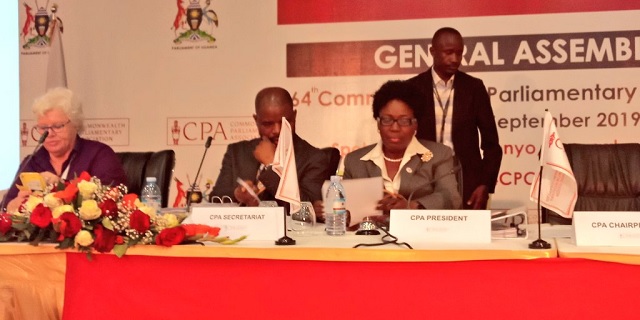
Kampala, Uganda | THE INDEPENDENT | Commonwealth Parliamentarians have made it clear there is need for authority to scrutinize laws they pass in order to check effectiveness.
The legislators currently meeting at the 64th Commonwealth Parliamentary Conference (CPC) at Speke Resort Munyonyo, were yesterday engaged in a workshop themed “Post Legislative Scrutiny-A Dimension of the Oversight Function of Parliament. How is this represented Within Different Political Systems.”
The panelists included; Wendy Hart, the Commonwealth Parliamentary Association (CPA) Pacific Regional Secretary, Rajendra Rejendra Trivedi, Speaker Gujarat Legislative Assembly and the Director Westminster Foundation for Democracy Zoe Oliver- Watts. The panel was chaired by Maryse Gaudreault, the Deputy Speaker of the National Assembly of Quebec.
Maryse said that legislation is a prime importance for everybody, hence a need for legislators to ensure that the legislations passed have no unforeseen consequences for the people. She underscored the role of Post Legislative Scrutiny in checking whether legislation passed is working and yielding the anticipated benefits.
During their presentations, Wendy Hart said that post-legislative scrutiny is a valuable oversight tool, part of an end to end process through which parliaments can evaluate efficacy, quality and relevance.
The Gujarat Speaker Rajendra Trivedi recommended that parliament should evaluate implementation of legislation passed and policy framework of government through well-structured committee system as well as other institutional mechanisms.
The Director for Westminster Foundation for Democracy Zoe Oliver- Watts said that post legislative scrutiny required resources and that in designing post legislative scrutiny systems, parliaments should consider what they can contribute themselves and what they can ask others to contribute.
Drawing experience from the House of Lords and Commons in the United Kingdom, Zoe highlighted post legislative scrutiny as largely undertaken by parliamentary committees and preceded by government review.
“In the event the review is found satisfactory, committees do not undertake scrutiny. However if assessed that the review is deficient then Committee sets up an inquiry that involves public hearings. Upon reporting to the House, government is expected to respond within 2 months,” said Zoe.
She noted that post legislative scrutiny may not necessarily be systematic to commence by reviewing a piece of legislation but may be kicked off by a need to address a public concern. In his reaction to the topic, Deputy Speaker Jacob Oulanyah, the pre-legislative scrutiny function of parliament was clear since it is highlighted in the Constitution, the Parliament Rules of Procedure and a number of other laws and that the question was now on the post legislative scrutiny.
“We are talking about scrutiny and oversight. Unlike estimates and pre-legislative scrutiny that has well laid procedures in the constitution and Rules of Procedure, post legislative scrutiny has no laid down procedure,” said Oulanyah.
He said that it was crucial that parliaments in commonwealth prescribe a procedure for post legislative scrutiny.
Nakasongola Woman MP Margaret Komuhangi also cited a need for a legal framework for parliament to carry out post legislative scrutiny recommending entrenchment of a provision in the Constitution that requires parliament to carry out the activity.
However, Bugiri Municipality MP Asuman Basalirwa said that whereas legislation is a parliamentary function, implementation was for government. He wondered how the doctrine of separation of powers would be respected if parliaments are given power to scrutinize laws passed.
But Zoe Oliver- Watts insisted that holding government accountable is a role of parliament and not to take over the role of government for implementation of legislation.
*****
URN
 The Independent Uganda: You get the Truth we Pay the Price
The Independent Uganda: You get the Truth we Pay the Price


